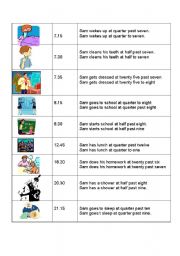
|
Choose the True statement: does he or doesn�t he?
In this worksheet the student identifies the true statement from two, matching the time in words with the digital time given.
It can extend into questions about the students own daily routine. It talks about going to school, but could be altered to suit the age and routine of your students.
Level: elementary
Age: 10-17
Type: worksheet
Downloads: 9
|
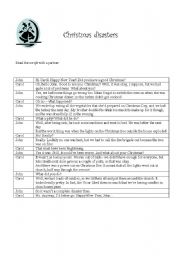
|
Christmas Disasters
Reading a script with discussion.
Identifying the disasters & solutions
Discussion using second conditional
Level: intermediate
Age: 14-17
Type: worksheet
Downloads: 5
|
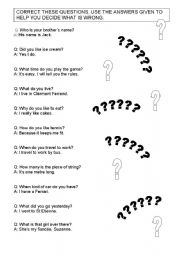
|
Correcting Questions
Good for checking undersatanding of question words, this gives questions (using an incorrect question word) and answers. The student must correct the question word.
For example:
Q: How do you live?
A: I live in Lyon.
Of course, the question word should be: WHERE do you live?
Not very exciting, but good for checking understanding!
Level: intermediate
Age: 14-17
Type: worksheet
Downloads: 5
|
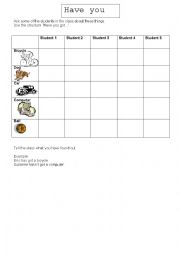
|
Have Yopu Got?
Students interview each other about possessions, using "Have you got a..." Then report back to the class (Timo has/hasn�t got...)
Level: elementary
Age: 6-11
Type: worksheet
Downloads: 0
|
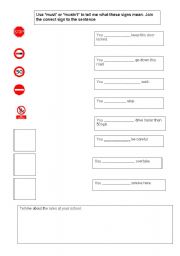
|
MUST/MUSTN�T
Practising the use of must and mustn�t in the context of identifying signs.
Following on the student (in my case a ten year old boy) identified things he must/mustn�t do at school. Could be changed to university/work/at home if that was more suitable
Level: elementary
Age: 10-17
Type: worksheet
Downloads: 8
|
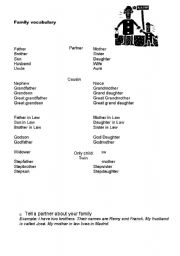
|
Talking about families
This worksheet includes a list of family vocabulary, divided into male/female equivalents. It�s then followed by a family tree to fill in, following clues given that use the words from the list.
I combine this with showing photos of my family, when students ask me questions to find out who the people are & to fill in my blank family tree. A fun l...
Level: elementary
Age: 10-17
Type: worksheet
Downloads: 2
|